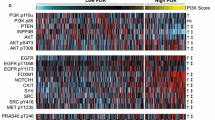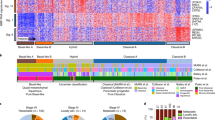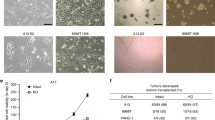Abstract
Background/purpose
The combined contributions of oncogenes and tumor suppressor genes toward carcinogenesis remain poorly understood. Elucidation of cancer gene cooperativity can provide new insights leading to more effective use of therapies.
Experimental design/Methods
We used somatic cell genome editing to introduce singly and in combination PIK3CA mutations (E545K or H1047R) with TP53 alterations (R248W or knockout), to assess any enhanced cancerous phenotypes. The non-tumorigenic human breast epithelial cell line, MCF10A, was used as the parental cell line, and resultant cells were assessed via various in vitro assays, growth as xenografts, and drug sensitivity assays using targeted agents and chemotherapies.
Results
Compared to single-gene-targeted cells and parental controls, cells with both a PIK3CA mutation and TP53 alteration had increased cancerous phenotypes including cell proliferation, soft agar colony formation, aberrant morphology in acinar formation assays, and genomic heterogeneity. Cells also displayed varying sensitivities to anti-neoplastic drugs, although all cells with PIK3CA mutations showed a relative increased sensitivity to paclitaxel. All cell lines remained non-tumorigenic.
Conclusions
This cell line panel provides a resource for further elucidating cooperative genetic mediators of carcinogenesis and response to therapies.






Similar content being viewed by others
References
Boyault S, Drouet Y, Navarro C, Bachelot T, Lasset C, Treilleux I, Tabone E, Puisieux A, Wang Q (2012) Mutational characterization of individual breast tumors: TP53 and PI3K pathway genes are frequently and distinctively mutated in different subtypes. Breast Cancer Res Treat 132(1):29–39
Abukhdeir AM, Vitolo MI, Argani P, De Marzo AM, Karakas B, Konishi H, Gustin JP, Lauring J, Garay JP, Pendleton C et al (2008) Tamoxifen-stimulated growth of breast cancer due to p21 loss. Proc Natl Acad Sci USA 105(1):288–293
Cidado J, Wong HY, Rosen DM, Cimino-Mathews A, Garay JP, Fessler AG, Rasheed ZA, Hicks J, Cochran RL, Croessmann S et al (2016) Ki-67 is required for maintenance of cancer stem cells but not cell proliferation. Oncotarget 7(5):6281–6293
Cochran RL, Cidado J, Kim M, Zabransky DJ, Croessmann S, Chu D, Wong HY, Beaver JA, Cravero K, Erlanger B et al (2015) Functional isogenic modeling of BRCA1 alleles reveals distinct carrier phenotypes. Oncotarget 6(28):25240–25251
Gustin JP, Karakas B, Weiss MB, Abukhdeir AM, Lauring J, Garay JP, Cosgrove D, Tamaki A, Konishi H, Konishi Y et al (2009) Knockin of mutant PIK3CA activates multiple oncogenic pathways. Proc Natl Acad Sci USA 106(8):2835–2840
Zabransky DJ, Yankaskas CL, Cochran RL, Wong HY, Croessmann S, Chu D, Kavuri SM, Red Brewer M, Rosen DM, Dalton WB et al (2015) HER2 missense mutations have distinct effects on oncogenic signaling and migration. Proc Natl Acad Sci USA 112(45):E6205–E6214
Wang GM, Wong HY, Konishi H, Blair BG, Abukhdeir AM, Gustin JP, Rosen DM, Denmeade SR, Rasheed Z, Matsui W et al (2013) Single copies of mutant KRAS and mutant PIK3CA cooperate in immortalized human epithelial cells to induce tumor formation. Cancer Res 73(11):3248–3261
McGranahan N, Swanton C (2015) Biological and therapeutic impact of intratumor heterogeneity in cancer evolution. Cancer Cell 27(1):15–26
Soule HD, Maloney TM, Wolman SR, Peterson WD Jr, Brenz R, McGrath CM, Russo J, Pauley RJ, Jones RF, Brooks SC (1990) Isolation and characterization of a spontaneously immortalized human breast epithelial cell line, MCF-10. Cancer Res 50(18):6075–6086
Croessmann S, Wong HY, Zabransky DJ, Chu D, Mendonca J, Sharma A, Mohseni M, Rosen DM, Scharpf RB, Cidado J et al (2015) NDRG1 links p53 with proliferation-mediated centrosome homeostasis and genome stability. Proc Natl Acad Sci USA 112(37):11583–11588
Weiss MB, Vitolo MI, Mohseni M, Rosen DM, Denmeade SR, Park BH, Weber DJ, Bachman KE (2010) Deletion of p53 in human mammary epithelial cells causes chromosomal instability and altered therapeutic response. Oncogene 29(33):4715–4724
Konishi H, Lauring J, Garay JP, Karakas B, Abukhdeir AM, Gustin JP, Konishi Y, Park BH (2007) A PCR-based high-throughput screen with multiround sample pooling: application to somatic cell gene targeting. Nat Protoc 2(11):2865–2874
Mohseni M, Cidado J, Croessmann S, Cravero K, Cimino-Mathews A, Wong HY, Scharpf R, Zabransky DJ, Abukhdeir AM, Garay JP et al (2014) MACROD2 overexpression mediates estrogen independent growth and tamoxifen resistance in breast cancers. Proc Natl Acad Sci USA 111(49):17606–17611
Olive KP, Tuveson DA, Ruhe ZC, Yin B, Willis NA, Bronson RT, Crowley D, Jacks T (2004) Mutant p53 gain of function in two mouse models of Li-Fraumeni syndrome. Cell 119(6):847–860
Hollstein M, Sidransky D, Vogelstein B, Harris CC (1991) p53 mutations in human cancers. Science 253(5015):49–53
Hartwell L (1992) Defects in a cell cycle checkpoint may be responsible for the genomic instability of cancer cells. Cell 71(4):543–546
Bunz F, Fauth C, Speicher MR, Dutriaux A, Sedivy JM, Kinzler KW, Vogelstein B, Lengauer C (2002) Targeted inactivation of p53 in human cells does not result in aneuploidy. Cancer Res 62(4):1129–1133
Chan JY (2011) A clinical overview of centrosome amplification in human cancers. Int J Biol Sci 7(8):1122–1144
Lengauer C, Kinzler KW, Vogelstein B (1997) Genetic instability in colorectal cancers. Nature 386(6625):623–627
Beaver JA, Gustin JP, Yi KH, Rajpurohit A, Thomas M, Gilbert SF, Rosen DM, Ho Park B, Lauring J (2013) PIK3CA and AKT1 mutations have distinct effects on sensitivity to targeted pathway inhibitors in an isogenic luminal breast cancer model system. Clin Cancer Res 19(19):5413–5422
Hao Y, Wang C, Cao B, Hirsch BM, Song J, Markowitz SD, Ewing RM, Sedwick D, Liu L, Zheng W et al (2013) Gain of interaction with IRS1 by p110alpha-helical domain mutants is crucial for their oncogenic functions. Cancer Cell 23(5):583–593
Blair BG, Wu X, Zahari MS, Mohseni M, Cidado J, Wong HY, Beaver JA, Cochran RL, Zabransky DJ, Croessmann S et al (2015) A phosphoproteomic screen demonstrates differential dependence on HER3 for MAP kinase pathway activation by distinct PIK3CA mutations. Proteomics 15(2–3):318–326
Wu X, Renuse S, Sahasrabuddhe NA, Zahari MS, Chaerkady R, Kim MS, Nirujogi RS, Mohseni M, Kumar P, Raju R et al (2014) Activation of diverse signalling pathways by oncogenic PIK3CA mutations. Nat commun 5:4961
Ganem NJ, Godinho SA, Pellman D (2009) A mechanism linking extra centrosomes to chromosomal instability. Nature 460(7252):278–282
Vogelstein B, Kinzler KW (2004) Cancer genes and the pathways they control. Nat Med 10(8):789–799
Gerlinger M, Rowan AJ, Horswell S, Larkin J, Endesfelder D, Gronroos E, Martinez P, Matthews N, Stewart A, Tarpey P et al (2012) Intratumor heterogeneity and branched evolution revealed by multiregion sequencing. N Engl J Med 366(10):883–892
Author contributions
SC, BHP—Conception and design. SC, HYW, DJZ, RLC, WBD, PJH, JL, BHP—Development of methodology. SC, HYW, DJZ, JC, RLC, BE, BB, KC, KKS, PJH, JL, BHP—Acquisition of data. SC, HYW, DJZ, DC, DMR, JC, RLC, WBD, BE, KC, BBK-S, PJH, JL, BHP—Analysis and interpretation of data. SC, HYW, DJZ, DC, DMR, JC, RLC, WBD, BE, KC, BB, KK-S, PJH, JL, BHP—Writing, review, and/or revision of the manuscript.
Funding
This work was supported by: The Avon Foundation (B.H.P., J.L.), and NIH CA009071 (K.C., B.H.P.), GM007309 (D.J.Z.), CA168180 (R.L.C.), CA167939 (S.C.). We would also like to thank and acknowledge the support of NIH P30 CA006973, the Sandy Garcia Charitable Foundation, the Commonwealth Foundation, The Walsh Foundation, the Santa Fe Foundation, the Breast Cancer Research Foundation, the Health Network Foundation, the ME Foundation, the Augustine Fellowship (W.B.D.), and The Robin Page/Lebor Foundation. None of the funding sources influenced the design, interpretation, or submission of this manuscript.
Author information
Authors and Affiliations
Corresponding author
Ethics declarations
Conflict of interest
BHP is a paid member of the scientific advisory boards of Horizon Discovery, LTD, and Loxo Oncology, and has research contracts with Genomic Health, Inc and Foundation Medicine, Inc. Under separate licensing agreements between Horizon Discovery, LTD, and The Johns Hopkins University, BHP is entitled to a share of royalties received by the University on sales of products. The terms of this arrangement are being managed by the Johns Hopkins University, in accordance with its conflict of interest policies. All other authors declare no potential conflicts.
Ethical approval
All animal experiments were performed in accordance with institutional and the National Institutes of Health Guide for the Care and Use of Laboratory Animals guidelines. This article does not contain any studies with human participants performed by any of the authors.
Electronic supplementary material
Below is the link to the electronic supplementary material.
Rights and permissions
About this article
Cite this article
Croessmann, S., Wong, H.Y., Zabransky, D.J. et al. PIK3CA mutations and TP53 alterations cooperate to increase cancerous phenotypes and tumor heterogeneity. Breast Cancer Res Treat 162, 451–464 (2017). https://doi.org/10.1007/s10549-017-4147-2
Received:
Accepted:
Published:
Issue Date:
DOI: https://doi.org/10.1007/s10549-017-4147-2




